Akt 1 - Study guides, Class notes & Summaries
Looking for the best study guides, study notes and summaries about Akt 1? On this page you'll find 73 study documents about Akt 1.
Page 4 out of 73 results
Sort by
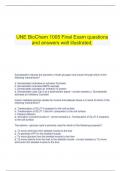
-
UNE BioChem 1005 Final Exam questions and answers well illustrated.
- Exam (elaborations) • 11 pages • 2024
- Available in package deal
-
- $11.99
- + learn more
UNE BioChem 1005 Final Exam questions and answers well illustrated. Somatostatin reduces the secretion of both glucagon and insulin through which of the following mechanisms? a. Somatostatin activates an activator G-protein b. Somatostatin activates MAPK cascade c. Somatostatin activates an inhibitory G-protein d. Somatostatin uses Ca+2 as a downstream signal - correct answers.c. Somatostatin activates an inhibitory G-protein Insulin mediated glucose uptake by musc...
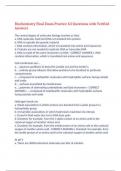
-
Biochemistry Final Exam Practice 63 Questions with Verified Answers,100% CORRECT
- Exam (elaborations) • 16 pages • 2024
-
- $10.99
- + learn more
Biochemistry Final Exam Practice 63 Questions with Verified Answers The central dogma of molecular biology teaches us that: a. RNA replicates itself and DNA is translated into protein b. RNA is typically the genetic material c. RNA contains information, which is translated into amino acid sequences d. Proteins are not needed to replicate DNA or transcribe RNA e. RNA is made of the same monomers as DNA - CORRECT ANSWER c. RNA contains information, which is translated into amino acid sequ...

-
UNE BioChem 1005 Final Exam Questions & Answers Solved 100% Correct!!
- Exam (elaborations) • 10 pages • 2024
-
- $12.49
- + learn more
UNE BioChem 1005 Final Exam Questions & Answers Solved 100% Correct!! Somatostatin reduces the secretion of both glucagon and insulin through which of the following mechanisms? a. Somatostatin activates an activator G-protein b. Somatostatin activates MAPK cascade c. Somatostatin activates an inhibitory G-protein d. Somatostatin uses Ca+2 as a downstream signal c. Somatostatin activates an inhibitory G-protein Insulin mediated glucose uptake by muscle and adipose tissue is a result of...
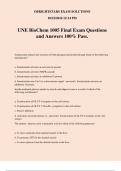
-
UNE BioChem 1005 Final Exam Questions and Answers 100% Pass.
- Exam (elaborations) • 15 pages • 2024
-
- $11.49
- + learn more
UNE BioChem 1005 Final Exam Questions and Answers 100% Pass. Somatostatin reduces the secretion of both glucagon and insulin through which of the following mechanisms? a. Somatostatin activates an activator G-protein b. Somatostatin activates MAPK cascade c. Somatostatin activates an inhibitory G-protein d. Somatostatin uses Ca+2 as a downstream signal - answerc. Somatostatin activates an inhibitory G-protein Insulin mediated glucose uptake by muscle and adipose tissue is a result of wh...
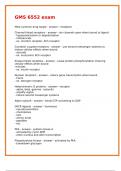
-
GMS 6552
- Exam (elaborations) • 14 pages • 2024
-
- $11.49
- + learn more
Most common drug target - answer-- receptors Channel-linked receptors - answer-- ion channels open when bound to ligand - hyperpolarization or depolarization - milliseconds - ex. nicotinic receptor, ACh receptor G-protein coupled receptors - answer-- use second messenger systems to induce cellular effects when bound - seconds - ex. muscarinic ACh receptor Kinase-linked receptors - answer-- cause protein phosphorylation inducing cellular effects when bound -minutes - ex. insulin r...
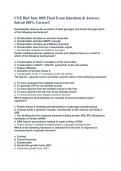
-
UNE BioChem 1005 Final Exam Questions & Answers Solved 100% Correct!!
- Exam (elaborations) • 10 pages • 2024
-
- $10.99
- + learn more
UNE BioChem 1005 Final Exam Questions & Answers Solved 100% Correct!! Somatostatin reduces the secretion of both glucagon and insulin through which of the following mechanisms? a. Somatostatin activates an activator G-protein b. Somatostatin activates MAPK cascade c. Somatostatin activates an inhibitory G-protein d. Somatostatin uses Ca+2 as a downstream signal c. Somatostatin activates an inhibitory G-protein Insulin mediated glucose uptake by muscle and adipose tissue is a result of...
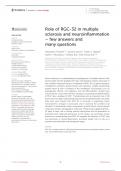
-
Role of RGC-32 in multiple sclerosis and neuroinflammation – few answers and many questions
- Exam (elaborations) • 9 pages • 2024
-
- $13.49
- + learn more
RGC-32 as a key regulator of Th17 cell differentiation Using an RGC-32 knock-out (KO) mouse model, we have been able to demonstrate that RGC-32 promotes the differentiation of Th17 cells both in vitro and in vivo. When compared to wild-type (WT) cells, CD4+ cells isolated from RGC-32 KO mice express lower levels of IL-17, as well as some of the transcription factors necessary for Th17 differentiation, including retinoic acid receptor-related orphan receptor gamma t (RORgt), B cell–ac...
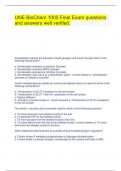
-
UNE BioChem 1005 Final Exam questions and answers well verified.
- Exam (elaborations) • 11 pages • 2024
- Available in package deal
-
- $12.99
- + learn more
UNE BioChem 1005 Final Exam questions and answers well verified. Somatostatin reduces the secretion of both glucagon and insulin through which of the following mechanisms? a. Somatostatin activates an activator G-protein b. Somatostatin activates MAPK cascade c. Somatostatin activates an inhibitory G-protein d. Somatostatin uses Ca+2 as a downstream signal - correct answers.c. Somatostatin activates an inhibitory G-protein Insulin mediated glucose uptake by muscl...
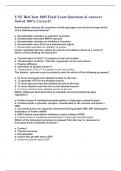
-
UNE BioChem 1005 Final Exam Questions & Answers Solved 100% Correct!!
- Exam (elaborations) • 10 pages • 2024
-
- $13.49
- + learn more
UNE BioChem 1005 Final Exam Questions & Answers Solved 100% Correct!! Somatostatin reduces the secretion of both glucagon and insulin through which of the following mechanisms? a. Somatostatin activates an activator G-protein b. Somatostatin activates MAPK cascade c. Somatostatin activates an inhibitory G-protein d. Somatostatin uses Ca+2 as a downstream signal c. Somatostatin activates an inhibitory G-protein Insulin mediated glucose uptake by muscle and adipose tissue is a result of...
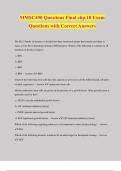
-
MMSC490 Questions Final chp.18 Exam Questions with Correct Answers
- Exam (elaborations) • 7 pages • 2024
- Available in package deal
-
- $11.49
- + learn more
MMSC490 Questions Final chp.18 Exam Questions with Correct Answers The Bcl-2 family of proteins is divided into three functional groups that contain and share as many as four Bcl-2 homology domains (BH domains). Which of the following is common to all members of the Bcl-2 family? a. BH1 b. BH2 c. BH3 d. BH4 - Answer ️️ -BH3 which of the following stem cells have the capacity to give rise to all the differentiated cell types of adult organisms? - Answer ️️ -embryonic stem cells ...

How did he do that? By selling his study resources on Stuvia. Try it yourself! Discover all about earning on Stuvia


